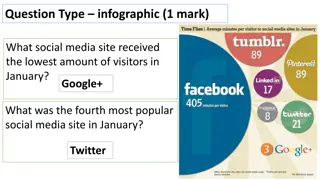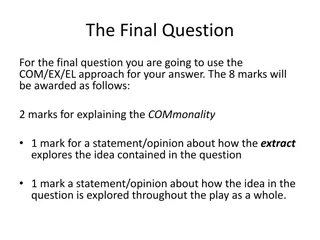Cleopatra's Popularity and Character Analysis
Cleopatra's popularity fluctuated among the people of Alexandria, with some perceiving her as submitting to Roman control while others saw her as a strong leader. Despite facing challenges early in her reign, Cleopatra managed to raise support and maintain her rule through political maneuvers and associations with the Egyptian goddess Isis. Her character, as depicted in Greek and Roman sources, remains a subject of debate due to limited and biased evidence. Students are tasked with analyzing the accuracy of these sources to understand Cleopatra's true personality traits.
Download Presentation

Please find below an Image/Link to download the presentation.
The content on the website is provided AS IS for your information and personal use only. It may not be sold, licensed, or shared on other websites without obtaining consent from the author. Download presentation by click this link. If you encounter any issues during the download, it is possible that the publisher has removed the file from their server.
E N D
Presentation Transcript
30 September Cleopatra s popularity and character 2024 (Underline date and title using a pencil and ruler) RRR: Cleopatra s character Lesson Objectives: 1. To understand the ways in which Cleopatra s personality has been presented in ancient sources. Revise, Review, Recap 1. 2. 3. 3 key features of Cleopatra s upbringing The name of each of Cleopatra s siblings 3 challenges that Cleopatra faced during her early years as queen Explain which sibling you think had the BEST relationship with Cleopatra 4. 2. To assess the nature of her relationship with her people. Key words/Spellings: Cleopatra, Macedonian, heritage, Alexandria
Cleopatras popularity in Egypt The elite of Alexandria were powerful people that any Pharaoh would want on their side. Some believed she was giving away Egyptian power in favour of Roman control The vast majority of the material we have on Cleopatra focuses on her external interactions with Greek and Roman powers, rather than the day-to-day rule of her nation. However it would seem as though at the beginning of her reign she was unpopular with the Alexandrians, who saw her as a leader who was essentially submitting to Rome. This was a perception that her brother, Ptolemy XIII, and his advisors played on heavily when they had her ousted from the city when they were vying for the throne. Interestingly, in 50BC, Cleopatra forced all grain remaining after the poor harvest to be shipped to Alexandria, which could well have been a bid to increase her popularity in this influential and powerful city. However, we can t ignore the fact that Cleopatra was able to raise an army to march on Ptolemy XIII/ Alexandria, so clearly she must have had significant support outside of this city. Julius Caesar helped put Cleopatra back into power, but this did not automatically increase her popularity, in Alexandria or elsewhere, and her decision to go on procession down the Nile could well have been a bid to promote herself as the rightful Queen of Egypt. Cleopatra s Egypt suffered serious famines and civil unrest in 41BC and 40BC, but she seems to have managed an effective government that was able to steer the country through these difficulties. Around this time, she also began to associate herself closely with the Goddess Isis, as a New Isis for the people of Egypt. This was a propagandist move aimed at drawing Cleopatra closer to the native Egyptians and the Greek population of Alexandria. The land she gained, even through Roman help, would also have gone some way to increasing her popularity over time, as this increased Egyptian prestige and helped to ease the burden of debts left by Ptolemy XII Auletes. Cleopatra spent months travelling down the Nile with Caesar, visiting different cities REMEMBER Auletes had incurred huge debts when asking the Romans for help in taking back his throne. Gabinian mercenarie s! Incredibly powerful, protective Goddess, one of the most important in Egyptian religion. Mother/W ife
Cleopatra's character As depicted in the sources The biggest challenge in discussing Cleopatra s character is the availability of source material. The small amount of evidence from her lifetime tends to be from non-Egyptian sources, and the main sources on her life are Greek and Roman, and were written years after her death by men who never met her. However, we can still take meaningful information away from these sources, which give us the ability to form some image of what Cleopatra s character was. TASK: using p.160-162 of the textbook, and the referenced prescribed sources from your source pack, complete notes on the different elements of Cleopatra s character. - Remember, this activity is as much about analysing the accuracy of sources, as it is about learning Cleopatra s character! 1. Historical examples of that personality trait. We just MUST REMEMBER that as we are creating an image of Cleopatra, the sources we are using are limited and often somewhat hostile to Cleopatra. 2. Quotes from the sources to support this point. - Use the sources that are mentioned in the textbook with the blue PS next to them. EXAM PRACTISE 3. Issues of accuracy in the sources. - Do the sources ever focus on a particularly character trait for a specific reason? If so, this can possible effect their accuracy, NOTE IT DOWN! - use your cheat sheet! CHALLENGE: Using details from Plutarch, Life of Mark Anthony, 27, explain how accurate you think Plutarch s account of Cleopatra s charm is. (5)

















































